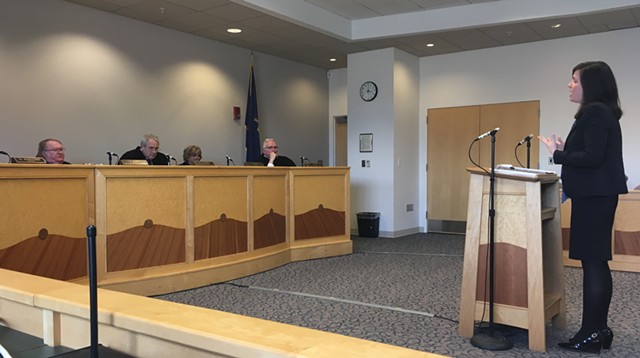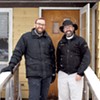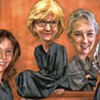click to enlarge 
- Deputy Chittenden County State's Attorney Aimee Griffin argues before the Vermont Supreme Court.
A Ku Klux Klan member convicted of a crime after distributing his organization's recruitment fliers
at the homes of two minority women in Burlington was exercising his free speech rights, his attorneys argued before the Vermont Supreme Court on Wednesday.
William D. Schenk pleaded no contest to two misdemeanor charges of disorderly conduct in April 2016, but his
attorneys always insisted they would appeal a judge's decision not to throw out the charges on First Amendment grounds.
"It is not a crime to peacefully distribute a flier to join a group," Rebecca Turner, supervising attorney from the Appellate Division of the Defender General's Office, told justices. "The message is not indicating violence is imminent, or threatening to these individuals."
Deputy Chittenden County State's Attorney Aimee Griffin argued that even if the literal message of the fliers was recruitment, Schenk was obviously targeting the women for other purposes.
"This is not a case about suppressing a defendant's free speech rights. He specifically targeted two women of color at their homes," Griffin said. "This flier in context is much different than … leafleting. This is targeting."
Schenk's appeal was heard Wednesday at Vermont Law School, where the high court holds an annual session of oral arguments.
click to enlarge 
- Burlington Police
- William D. Schenk
Schenk told investigators that he was on a recruiting mission for the KKK and had distributed around 50 fliers, which read "Join the Klan and save our land," in November 2015. He was 21 at the time.
But authorities said he left fliers for just two people: One of the women is African American, and the other identified herself as Mexican, according to court documents.
Schenk never encountered either woman. He told police he distributed fliers to dozens of homes, but police, after a thorough search, said they did not find any other residents who received the fliers.
"It's just a nonviolent Christian organization," he told police, according to affidavits. "You know how there is an NAACP? The whites really don't have that. It's kind of like a Christian fraternal organization." Schenk said he had made similar recruitment efforts in North Carolina.
As Associate Justice John Dooley noted, however, there is no evidence that Schenk knew the two women were minorities. He left the fliers wedged in their doors.
"You can infer they were targeted," Griffin argued. "They weren't even next-door neighbors. These are the only two women in the entire neighborhood that received the letter. It could be inferred that it was [Schenk's] intent to target them."
Associate Justices Harold Eaton and Marilyn Skoglund both asked whether, under Griffin's argument, anti-abortion groups that distribute fliers to pregnant women could face charges.
Griffin rejected the comparison, saying the KKK's "history of violence," represented a graver threat.
Schenk served five months in jail in Vermont. After that, he was taken to New York to face unrelated charges.
His whereabouts could not immediately be determined on Wednesday, but he was not in custody, according to the New York Department of Corrections and Community Supervision.
The Vermont Supreme Court did not rule Wednesday. Justices usually take several months to issue a decision.























































